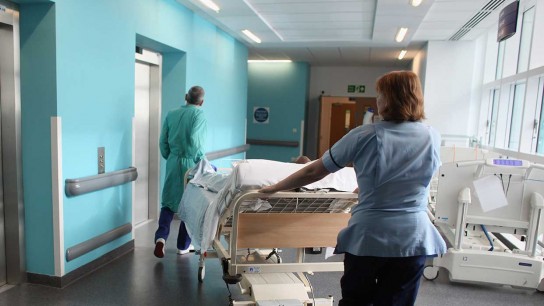NHS posts worst ever A&E performance results
Government decisions have left health service 'on its knees and in crisis', claims Labour

A free daily email with the biggest news stories of the day – and the best features from TheWeek.com
You are now subscribed
Your newsletter sign-up was successful
The NHS has published its worst A&E performance results on record, as figures suggest the 111 phoneline, introduced to help ease the pressure on emergency services, has failed.
Labour said the data showed the health service was "on its knees", with patients stuck on trolleys for hours in overcrowded casualty departments.
What is 111?
The Week
Escape your echo chamber. Get the facts behind the news, plus analysis from multiple perspectives.

Sign up for The Week's Free Newsletters
From our morning news briefing to a weekly Good News Newsletter, get the best of The Week delivered directly to your inbox.
From our morning news briefing to a weekly Good News Newsletter, get the best of The Week delivered directly to your inbox.
The 111 helpline was set up as an urgent but non-emergency number designed to replace the existing NHS Direct and work alongside 999.
However, the service has attracted controversy in the past, with a Daily Telegraph investigation in 2011 revealing that one in eight calls were going unanswered.
What do the statistics say?
Findings in the report include A&E patients being routinely stuck on trolleys for hours and the 111 service leaving people waiting for callbacks that never came.
A free daily email with the biggest news stories of the day – and the best features from TheWeek.com
"There has been nearly a fourfold increase in five years of emergency patients waiting more than four hours for a hospital bed," said Dr Jennifer Dixon, the chief executive of the Health Foundation.
Ambulance services also showed a decline, with just 68 per cent of life-threatening calls picked up within eight minutes, despite a target of 75 per cent.
What has the reaction been?
Labour's shadow health secretary, Heidi Alexander, claimed the figures were the result of bad government decisions. "Ministers need to accept that their policies are failing patients and failing the NHS," she said. "These figures show an NHS on its knees and in crisis."
The missed targets showed the critical need to change the way care is delivered, said the NHS Confederation's director of policy, Johnny Marshall.
"Hospitals are sandwiched between a constantly increasing demand for emergency care on the one hand and, on the other, difficulty discharging patients into the community due to social care cuts," he said.
-
 The problem with diagnosing profound autism
The problem with diagnosing profound autismThe Explainer Experts are reconsidering the idea of autism as a spectrum, which could impact diagnoses and policy making for the condition
-
 What are the best investments for beginners?
What are the best investments for beginners?The Explainer Stocks and ETFs and bonds, oh my
-
 What to know before filing your own taxes for the first time
What to know before filing your own taxes for the first timethe explainer Tackle this financial milestone with confidence
-
 A real head scratcher: how scabies returned to the UK
A real head scratcher: how scabies returned to the UKThe Explainer The ‘Victorian-era’ condition is on the rise in the UK, and experts aren’t sure why
-
 How dangerous is the ‘K’ strain super-flu?
How dangerous is the ‘K’ strain super-flu?The Explainer Surge in cases of new variant H3N2 flu in UK and around the world
-
 The ‘menopause gold rush’
The ‘menopause gold rush’Under the Radar Women vulnerable to misinformation and marketing of ‘unregulated’ products
-
 How the care industry came to rely on migrant workers
How the care industry came to rely on migrant workersThe Explainer Government crackdown on recruiting workers abroad risks deepening care sector crisis, industry leaders warn
-
 Could medics' misgivings spell the end of the assisted dying bill?
Could medics' misgivings spell the end of the assisted dying bill?Today's Big Question The Royal College of Psychiatrists has identified 'serious concerns' with the landmark bill – and MPs are taking notice
-
 Washwood Heath: Birmingham's pioneering neighbourhood health service
Washwood Heath: Birmingham's pioneering neighbourhood health serviceIn the Spotlight NHS England chair says there is a 'really good argument this is the model for the future'
-
 The UK's first legal drug consumption room
The UK's first legal drug consumption roomThe Explainer 'Potentially transformative moment in UK drugs policy' as The Thistle opens in Glasgow
-
 How can the UK solve the adult social care crisis?
How can the UK solve the adult social care crisis?Today's Big Question New commission announced to turn our buckling care sector around: yet more delay or finally a way forward?